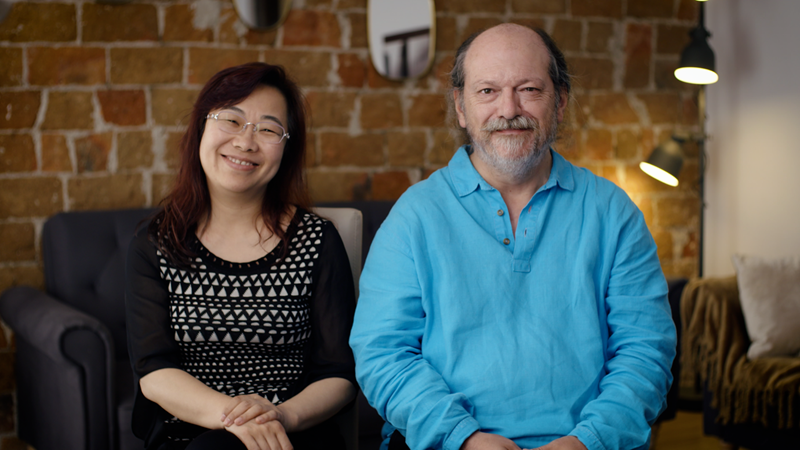Gabriel Loidi & Chen Manchun: A musical exchange across cultures and time
Madrid, the capital of Spain, is a city full of musical heritage. It is here that we met Gabriel Loidi, a composer, pianist, and professor of chamber music at the Higher School of Music of the Basque Country, alongside Chen Manchun, pianist and professor at the Central Conservatory of Music in Beijing, China.
Their friendship began in 1998, when Loidi first met Chen, who had arrived in Madrid on a scholarship to study piano for a year with him. Loidi vividly recalled his first impression watching Chen play, saying "I thought this is not a student. She's already a professional pianist."

Gabriel Loidi and Chen Manchun (Photo/Patrick Shead-Simmonds)
Chen, too, remembered their first meeting clearly. Worried about the language barrier, she brought a small translation device with her to Spain. But by the end of her first class, she realized they had a shared language – music. She explained that while she spoke no Spanish and only a little English, they understood each other through music.
Over the course of that year, Loidi and Chen worked closely together. "Like two friends, we worked through pieces, and I called her attention to things that I found relevant in the music," Loidi said. At the time, he was working on the last B Flat Sonata of Schubert and would often ask Chen for her thoughts. For Chen, this piece became a cornerstone of her musical career technically and intellectually. She likens the piece to an old friend, one she has shared her life with for 27 years.
For Loidi, music is a universal language – one that transcends words and expresses the most profound aspects of the human experience. Music is subjective, limited, and deeply truthful, he explained. Teaching music is about connecting with the person behind the instrument and cultivating their awareness to music. He went on to say how each person is unique and in the case of Chen, he was very aware that she understood music from the heart.
Chen was profoundly shaped by Loidi's teaching philosophy. She values mutual respect between teacher and student, which she believes was key to their meaningful relationship. She explained that there is no such thing as a bad teacher or student, rather it's just a question of compatibility. "It's like a key and a lock. Both can be good, but if they don't match, the door won't open." She also emphasized the importance of recognizing and nurturing each student's individual talents, a lesson she learned from Loidi and now passes on to her own students.
For Loidi, music is about intrinsic values, such as truth, beauty, and empathy, rather than instrumental concerns. He warned that the wrong motivations can lead to deep frustration. Music education, he believes, is not just about technical mastery, but about developing the ability to perceive and feel.
Chen echoed this view: "In a materialistic world full of distractions, classical music gives us space for stillness and self-reflection. Its meaning lies in the details, in every note, every chord. It demands full attention and immersion."
Loidi is currently composing a piano concerto dedicated to his teacher, Edith Vogel, who was born in Vienna in 1912 and taught him the technique of legato, as well as instilled in him a deep respect for musical tradition. Loidi said that Vogel believed the heart of music education lies in passing it on. He hopes that when the concerto is completed, Chen will perform it in China. Chen looks forward to the opportunity, seeing it as a meaningful collaboration that will reflect Loidi's musical spirit and their shared commitment to music.
The story of Loidi and Chen is not only a powerful testament to cross-cultural connection through music between China and Spain, but also across the world. Loidi expressed it best, saying that with music, you don't need words. Working with someone from a different country or a different culture becomes effortless. There are no limits to what musicians can create together.
(Web editor: Hongyu, Wu Chengliang)










